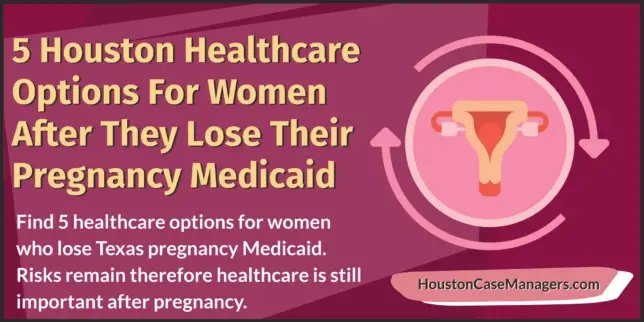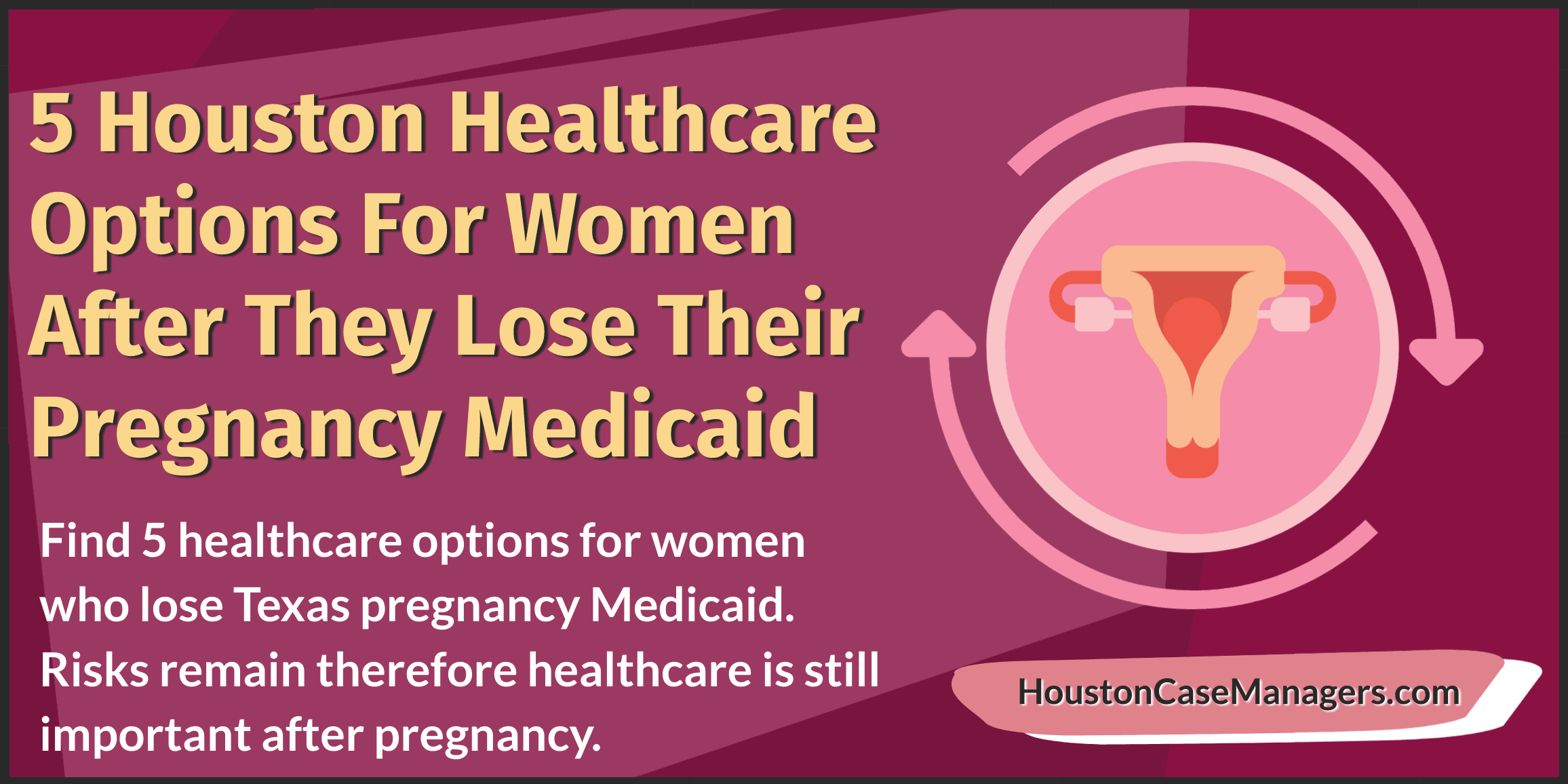5 Houston Healthcare Options For Women After They Lose Their Pregnancy Medicaid
In this guide, I will cover 5 Houston healthcare options for women to consider after their pregnancy Medicaid has ended.
It is important for Medicaid recipients to know about these options because for many it can come as a surprise when their coverage stops 60 days after the birth of their child.
Editor’s Note: The Families First Coronavirus Response Act (March 2020) protects women from being kicked off of pregnancy Medicaid during the pandemic. Prior to this federal law, a women’s pregnancy Medicaid ended 60 days after the birth of their child. If your pregnancy Medicaid somehow expired during the pandemic you should contact Texas Health and Humans Services at 877.541.7905. You can use this guide and it’s healthcare alternatives below to provide temporary care while you sort out the mix up with Texas Health and Human Services.
Most of the health risks that pregnant women face occur during the delivery, but that does not mean the postpartum period is smooth sailing. There are also complications during this time as well.
Before providing you with healthcare options after your pregnancy Medicaid expires lets first talk about what postpartum is and some of the risks that occur during this period.
Editor’s Note: If you are expecting and need to apply for pregnancy Medicaid see our guide titled Instantly Download Your Texas Medicaid Application. This guide will provide you with an application and instructions on how to apply for Medicaid.
What Is Postpartum?
Postpartum is defined as the 6-week period that occurs after childbirth. Some even refer to this as the “4th trimester”.
During this period your time is spent healing from your pregnancy and adjusting to all the new responsibilities and emotions that come with being a new mom.
Hopefully, this time is stress-free for moms, however, you should be aware that there are still health risks during this time. In the next section, we will discuss some of the medical complications that new moms face during postpartum.
Health Risks For Women During The Postpartum Stage
Some of the most common healthcare risks that women face after pregnancy include:
Hemorrhage After Childbirth
This is excessive bleeding and can be fatal if not monitored by a doctor during the postpartum stage. According to a CDC report, the rates of postpartum hemorrhage increased by 82% from 1993 to 2014.
High Blood Pressure (Preeclampsia and Eclampsia)
High blood pressure is another condition that women face during pregnancy and after. Two types of high blood pressure that women should be mindful of are preeclampsia and eclampsia.
Preeclampsia is a condition where women who did not have high blood pressure, suddenly develop it during pregnancy. Preeclampsia typically occurs 20 weeks into your pregnancy. If untreated preeclampsia can impact your liver, kidneys, and child.
Eclampsia is a more severe condition of preeclampsia that results in seizures during your pregnancy.
Infection Risks After Childbirth
Infections can also develop during the postpartum period. Risk factors that increase infection include medical conditions like obesity, diabetes, and the flu.
Sepsis (or blood poisoning) is the result of an infection. It is important that you are aware of this condition because it can be fatal if untreated.
Mental Health Problems Like Baby Blues And Postpartum Depression For Women After Childbirth
Another condition to guard against after your pregnancy is depression.
“Baby Blues” is a mild form of depression that some moms experience after pregnancy. The range of emotions can include crying spells, mood swings, anxiety, and problems sleeping. These emotions start within 2-3 days after childbirth and can last up to 2 weeks.
Postpartum depression is a more severe and longer-lasting form of depression. Some additional symptoms of postpartum depression include:
- Withdrawing form family and friends
- Fatigue or energy loss
- Irritability or anger
- Fear that you are not a good mother
- Thoughts of harming yourself or baby
- Suicidal thoughts
- Hopelessness
Editor’s note: If you are experiencing some of the symptoms above you can refer to the section in this article titled Mental Health Treatment. There you will find mental health treatment options to help you navigate any feelings of depression you may have.
1. Qualify For Medicaid Under A Different Criteria
Texas is very particular in regards to who qualifies for Medicaid. Of course, we know that low-income pregnant women qualify, but who else?
Below is the criteria to qualify for Texas Medicaid:
- Pregnant
- Caring for a child 18 years or younger who receives Medicaid
- Have a disability or a family member in your household with a disability
- 65 or older
In addition to this you must also fall under these Texas Medicaid household income limits:
| Household Size | Max Income Per Year |
| 1 | $25,265 |
| 2 | $34,136 |
| 3 | $43,006 |
| 4 | $51,876 |
| 5 | $60,747 |
| 6 | $69,617 |
| 7 | $78,488 |
| 8 | $87,358 |
If you lose your Texas Medicaid coverage because you are no longer pregnant, take a look at the other guidelines I just mentioned above. Are you caring for a child with Medicaid and you fall under the household income guidelines above? If so you could potentially qualify for Texas Medicaid under a new criteria.
The easiest ways to apply for Texas Medicaid are:
- Applying online at the Your Texas Benefits website
- Calling Texas Health and Human Services at 877.541.7905
For more information on applying for this benefit see our guide on applying for Texas Medicaid to download applications and receive step-by-step instructions on enrollment.
2. Harris Health System As An Option For Healthcare For Women After Pregnancy
The Harris Health Gold Card is the first healthcare option for women who lose their pregnancy Medicaid that we will discuss.
The Gold Card is a form of health coverage that is offered by the Harris Health System. This coverage was created to help Harris County residents who are considered low-income or uninsured.
The Gold Card offers the following medical services at local health care centers, specialty clinics, and Harris county hospitals:
- Primary care
- Pediatric care
- Geriatric medicine
- Dialysis
- HIV/AIDS care
- Cardiology
- Cancer care
- Stroke treatment
- Trauma care
- Counseling and psychiatry
- Prenatal services like natural and cesarean deliveries, birthing centers, childbirth classes, and mother’s workshops
To receive postpartum medical care through Harris Health System you will need to apply for the Gold Card. You can learn more about the enrollment process by calling the Harris Health eligibility line at 713.566.6509 or by reading our guide titled How To Apply For The Harris Health Gold Card.
3. Low-Cost Medical Clinics In Houston To Treat Women After Childbirth
Low-cost medical clinics in Houston offer another healthcare option for women who have recently lost their pregnancy Medicaid.
These facilities are sometimes referred to as Federally Qualified Health Centers (FQHCs) or even the “free clinics” in Houston. While these clinics are not technically free they are great options for uninsured women who are seeking a primary care doctor.
Low-cost medical clinics bill you based on “sliding scale” fees. These Houston clinics take a look at your income and charge you according to your monthly income. They refer to this payment model as a “sliding scale” because your cost will slide according to your income. Even if you make $0 each month these clinics will be able to work with you.
Some of the conditions that are treated at these Houston clinics are:
- Primary care
- Pediatrics
- Women’s health
- Behavioral health (counseling and psychiatry)
- STD treatment
- Chronic disease management
- OB/GYN
- Eyecare
- Dental
- And more…you can use our “Clinic Finder” Tool to search for clinics in your zip code and certain conditions treated at these clinics
To learn more about these postpartum care options see our guide titled 15 Low-Cost Medical Clinics In Houston That Treat The Uninsured.
4. Houston Mental Health Options For Women During Postpartum
During postpartum, your mental health is just as important as your physical health. It’s during this time that some women suffer from conditions like baby blues, postpartum depression, anxiety, and suicidal thoughts.
Luckily there are a number of low-cost mental health providers in Houston who treat postpartum depression.
Just like the FQHC clinics that we discussed in the previous section, these mental health clinics also operate based on a sliding-scale payment system. In addition to the self-pay models, these clinics also accept most major insurances like Medicaid Medicare, and private insurance.
Some of the mental health conditions that are treated in these clinics are:
- Postpartum depression
- Anxiety
- Bipolar disorder
- Baby blues
- Eating disorders
- Insomnia
- Personality disorders
For a complete list of places to seek help for baby blues or postpartum depression treatment in Houston see our guide titled Low-Cost Counseling In Houston. If you need to speak with someone immediately about depression you can contact the Harris Center’s Crisis Line at 713.970.7000. This helpline is available 24 hours a day.
5. Nurse Health Line Provides Free Medical Consultations
Our last option for medical care is the Nurse Health Line.
You can also call this number 24 hours a day and speak to registered nurses who are qualified to answer your medical questions.
Whether you have questions about bleeding after your pregnancy, hemorrhoids, high blood pressure, or anything else the nurses who answer this helpline can assist you. If your situation warrants immediate medical attention, the Nurse Health Line will help you to get to the nearest emergency room for treatment.
If you are unsure about whether you need to visit an emergency room for a health concern, call the Nurse Health Line at 713.338.7979 and they will provide you with proper guidance.
Conclusion
Under normal circumstances a woman would lose her Medicaid 60 days after the birth of her child, however, this rule has been changed due to the current pandemic that we are in. The Families First Coronavirus Response Act guards against women losing their pregnancy Medicaid during the pandemic.
Without this medical coverage, women would have a much tougher time dealing with health conditions like high blood pressure, hemorrhage, baby blues.
Even if you are in a position where you no longer have your pregnancy Medicaid you still have alternatives like the Gold Card, Houston FQHCs, low-cost counseling clinics, and the Nurse Health Line to provide you with medical treatment after childbirth.
Again do not let conditions like fever, heavy bleeding, chest pain, or depression go untreated after childbirth. These are all serious conditions that can occur after pregnancy, so be mindful of this. For medical help during your postpartum period contact any of the options discussed in this guide or call 911 if you are experiencing a medical emergency.
Nick Bryant is the author of Understanding Healthcare Is Half The Battle and a Senior Counselor with 13+ years of experience working in community health and mental health. He enjoys spending time with his family, watching WWE on Friday nights, and working toward a Google Data Analytics certification. If you have additional questions about community resources or government assistance programs, simply leave a comment below and he will follow up as soon as possible.



